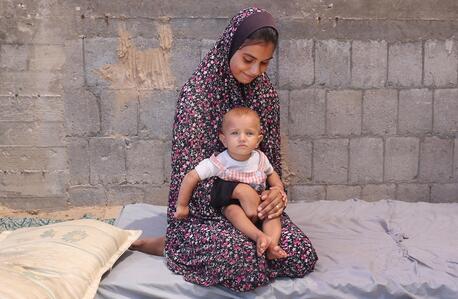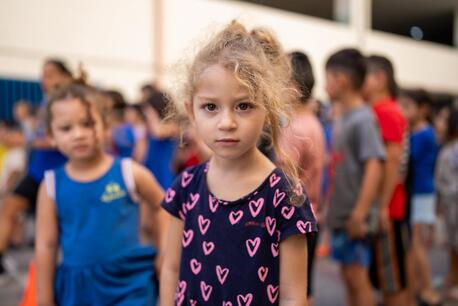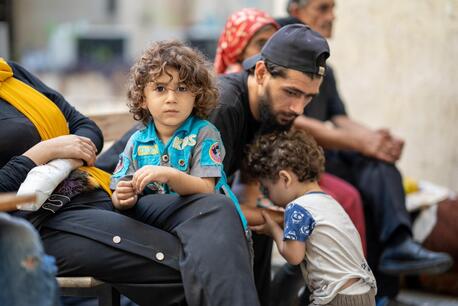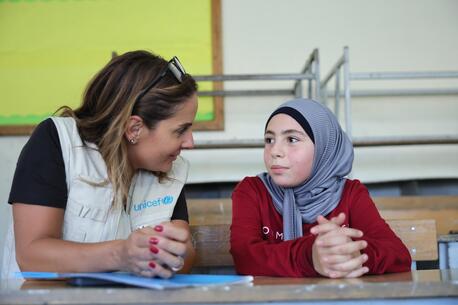
UNICEF in Jordan
UNICEF works closely with the Government of Jordan and other partners to deliver essential services to children and communities in need and to strengthen health, education and other essential systems. Learn more, including how to help.
Children at risk in Jordan
Jordan is home to the second-highest share of refugees per capita in the world, after Lebanon, with some 2.5 million Palestinian refugees — most of whom hold Jordanian citizenship, more than 660,000 Syrian refugees and another 100,000 refugees from Iraq, Somalia, Sudan and Yemen.
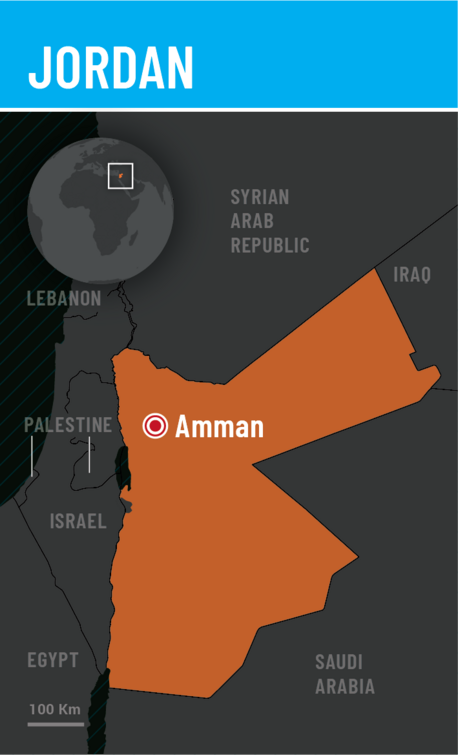
About half of all refugees in Jordan are under age 18. The vast majority (83 percent) live in urban areas, the rest in refugee camps.
With its sluggish economy and persistent water and energy challenges, the small nation of just over 11 million people is ill-equipped to handle the additional strain on resources.
In recent years, the national debt has continued to rise, as has the poverty rate, which, even excluding refugees, now looms at almost 16 percent. The poverty rate for Syrian refugees is 80 percent.
The economic situation makes it more likely vulnerable families will send boys to work, and arrange for girls to marry at a young age. Reports of domestic violence and violence against children have been on the rise, with almost 70 percent of women and girls in Jordan reporting they have been victims.
The country also suffers from extreme water scarcity due to rising temperatures, less reliable seasonal rainfall and drought.
Problems in child nutrition, education
There are a growing number of nutrition-related challenges in Jordan as well. Only 26 percent of babies under 6 months old are exclusively breastfed. Maternal, infant and young child nutrition rates all fall below international goals. Obesity prevalence is also alarmingly high among children as well as adults. Women have the worst rates of obesity and undernutrition, indicating a significant gender gap in nutrition.
In education, even those students who attend school have fallen behind. Before COVID-19 prompted schools to close, about one-third of all Syrian refugee children in Jordan aged 6 to 15 were not attending. Most students aged 10 to 12 years old in Za'atari and Azraq camps cannot read a simple story. Other data suggests that many more students, regardless of location or status, are not meeting grade-level expectations in math and Arabic.
UNICEF is working with government bodies to deliver essential services to the nation’s most vulnerable communities, while launching a series of new efforts designed to strengthen existing systems. Closing educational gaps and protecting the health and well-being of Jordan’s youth is considered essential for its future success.
Here are some examples of UNICEF's impact in Jordan.
How UNICEF is helping children in Jordan
In water-scarce areas in southern Jordan, UNICEF focuses on ensuring equitable access to safe water by improving water networks. Part of this work includes the construction and rehabilitation of small to medium-sized water and wastewater infrastructure in climate-vulnerable areas in the south of Jordan.
UNICEF is also working with the government to help update maps highlighting communities vulnerable to water stress, conduct assessments of the capacity to meet those challenges and help plan for future ones.
To address the water crisis in the southern district of Mreighah, in Ma'an governorate, for example, UNICEF partnered with the Aqaba Water Company on the construction of a more energy-efficient, sustainable water transmission pipeline. The project helped improve safe water access for 17,500 residents while reducing water losses due to leakages or theft.
Ten community volunteers were chosen to establish a community water committee to ensure input into project design and implementation and to facilitate a dialogue with the government and utility providers.
“Our job has been to relay the complaints and suggestions to the authorities responsible for water in the area, with the support of UNICEF,” explains Khetam, a mother of 10 who serves as head of the committee. “We worked to represent the entire community. Significantly, we helped defuse tensions between the residents and the operators of the water network.”
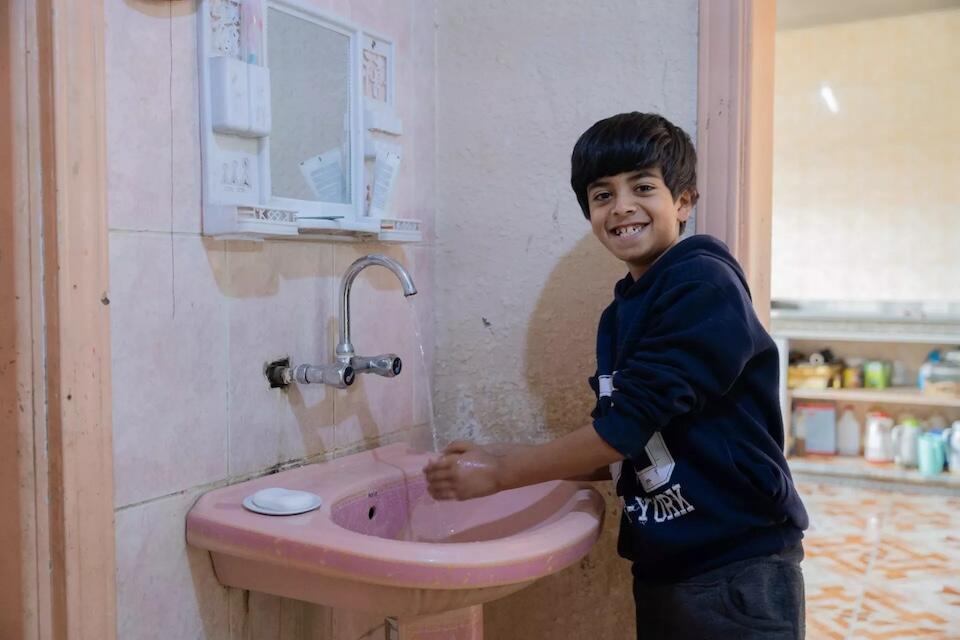
UNICEF is helping to build Jordan’s health system infrastructure and capacities to better serve the most vulnerable children and families in the country, including refugees. These efforts include building out the national electronic Health Information System (eHIS) to capture real-time service delivery data.
UNICEF is also supporting the development and scale-up of a national nutrition strategy, which was launched by the Ministry of Health in the summer of 2022. That includes providing hundreds of desktop computers and laptops to health centers around the nation, along with trainings for health workers — all of which have led to significant improvements in the ability of health facilities to monitor and report on the state of maternal and child health in their communities.
To strengthen preventive care and healthy habits, UNICEF promotes the use of primary health care providers, an underutilized resource in Jordan. UNICEF has also supported trainings for frontline health workers and educators to build capacities for providing children and adolescents with psychosocial and mental health support.
In child immunization, UNICEF focuses on identifying and helping to address gaps in the national immunization system. Support includes conducting a cold chain equipment inventory assessment and procuring insulated cold cars and electric and solar-powered fridges.
A recent UNICEF-led data analysis of the immunization records of children in the second year of life, for instance, indicated a lower coverage rate for measles mumps and rubella (MMR2) and a higher dropout rate between MMR1 and MMR2. Financial and technical support helped significantly improve vaccine coverage, and lowered dropout rates.
Supporting refugee children and families in Jordan
Children and families living in Azraq, Za’atari and Garden refugee camps and in the Rukban settlement continue to rely on UNICEF-led efforts that provide safe water and sanitation.
In the Azraq camp, UNICEF has helped strengthen pediatric health services, enabling consultations in hospitals and clinics, access to inpatient care as needed and the identification and treatment of malnourished children. UNICEF also supports individual and group counseling sessions for mothers to promote positive infant and young child feeding practices.
Building a better future for Jordan’s children through education
UNICEF has been helping to transform Jordan’s educational system by providing teacher training and other professional development support.
In partnership with Jordan’s Ministry of Education (MoE), UNICEF is also working to improve data collection on student learning and to design interventions to improve learning in critical subject areas such as math, Arabic and reading. After assessing hundreds of thousands of children in Grades 4 through 11, UNICEF and the MoE introduced acceleration classes in those subjects.
UNICEF has also helped develop resources to support the teaching of core curricula content across subject areas. A reading recovery intervention is helping adolescents catch up.
There are programs for Syrian refugees too, including accelerated classes in math and Arabic. For refugee students living in camps, UNICEF focuses on improving student access to quality education and attendance by mentoring and coaching principals who oversee the 47 camp schools located in the Azraq and Za’atari camps, supporting school operations and kindergarten centers reaching tens of thousands of students and providing school security, cleaning and maintenance services, infrastructure and equipment.
Weam, 35, is a Syrian refugee who has lived in Za’atari camp since it opened in 2011. With UNICEF’s support and training, she is now an assistant teacher in one of the camp’s kindergartens. Like her colleagues, Weam is trained to help young students develop their literacy skills. She runs reading circles in the classroom and works with young students one on one, helping them develop critical thinking and social skills.
“When the children first start kindergarten, it’s difficult for them to adjust to the new environment,” Weam says. “They are used to the attention of their mothers and they need someone to help them transition to school life and the start of their learning experience. I look after them from when they enter the kindergarten gates to the classroom, and as they are leaving.”
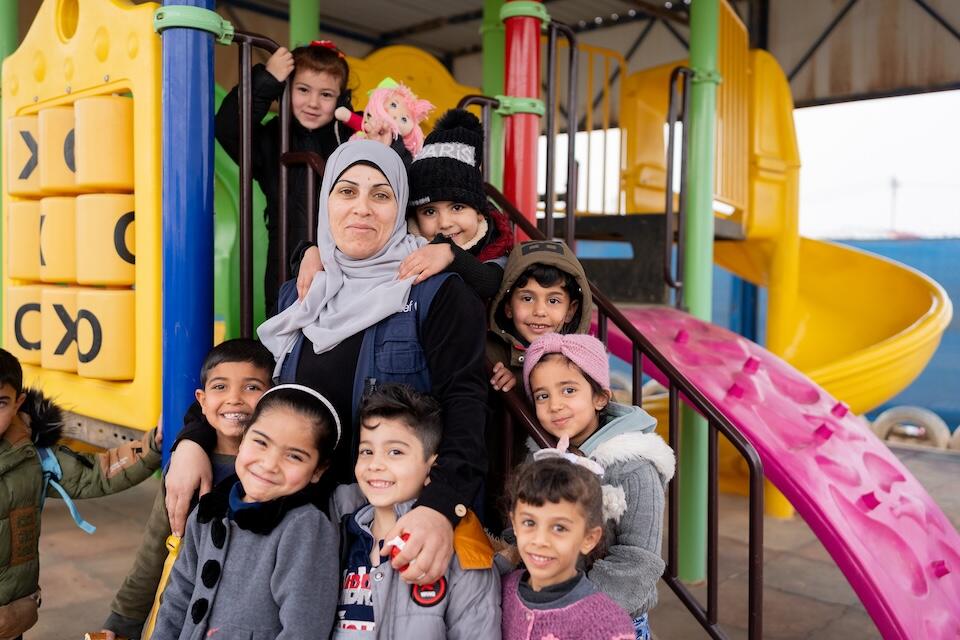
To help older kids, UNICEF has been expanding its Makani program, named after the Arabic word meaning "My Space." Launched in 2015 as a way for Syrian refugees to access education, learn life skills like problem-solving, negotiation, resilience and creativity, and receive child protection and other services, the initiative now reaches adolescents from other vulnerable and marginalized groups across the nation. Adolescents who regularly attend school and participate in life skills-building sessions are eligible to receive cash transfers.
Makani centers play a key role in identifying out-of-school children and referring them to UNICEF and partners, who can help enroll them in formal or non-formal education programs. “The biggest issue is the lack of integration,” says Nadeen Maharmah, a Makani center facilitator. “It’s normal to have 12- and 13-year-olds with no reading or writing skills because they’ve never been to school."
Related: UNICEF Helps Youth Build Life Skills In Jordan
The centers also help enhance social cohesion among children from different backgrounds, encouraging children from different communities to learn from one another.
Maharmah’s students include Yasmeen, a Syrian refugee whose family settled in Amman, and Yasmeen’s neighbor Aisha, a member of a marginalized Jordanian community known as the Dom. Both girls had faced challenges accessing education before coming to the Makani center.
Despite cultural differences and initial language barriers — Yasmeen spoke Arabic, and at first Aisha only spoke Turkman — the girls became fast friends. “It is very important for us to make sure these children feel that the center is a safe place for all of them, and to make it feel like home," Maharmah says.
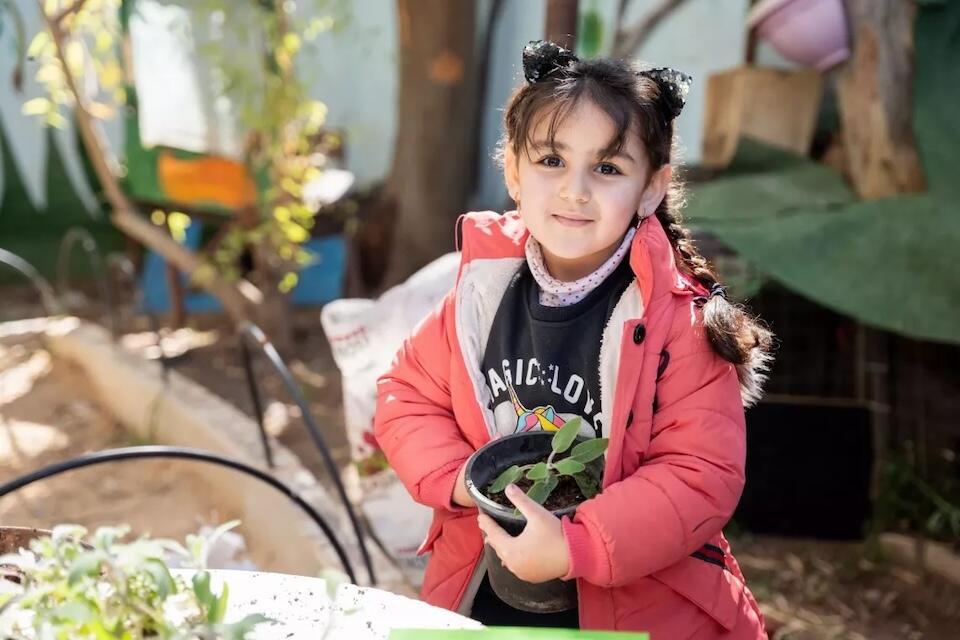
A focus on youth engagement, leadership in climate action
In partnership with the Ministry of Environment, Ministry of Youth and Generations For Peace, a global nonprofit organization, UNICEF is helping young people in Jordan develop the skills they need to respond to the climate crisis — as leaders of community-based initiatives and as local, national and global advocates for climate action.
The UNICEF-supported Sawn program, launched in 2022, has already trained dozens of individuals who are now designing and leading various projects in all of Jordan's 12 governorates.
Sawn Youth Climate Leaders Ruba, 23, and Mahdi, 23, co-lead a “Climate Friends” initiative in Zarqa focused on educating young children about climate change. Anwar, a 26-year-old engineer and Sawn program graduate, demonstrates and advocates for sustainable farming practices in Jerash.
Ruba visits classrooms and leads activities and games that introduce concepts such as greening and recycling. “Whatever [children] learn from an early age can have an impact on their actions for the rest of their lives,” she explains. Her main message: "If we take care of the environment, the environment will take care of us."
UNICEF works in more than 190 countries and territories to ensure children are healthy, educated, protected and respected. Learn more about what UNICEF does.
